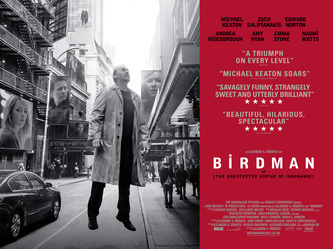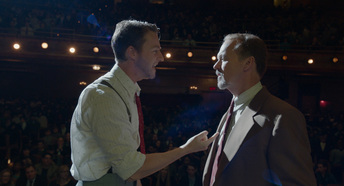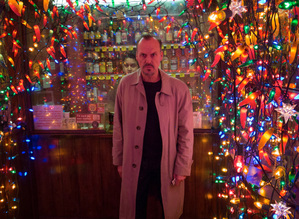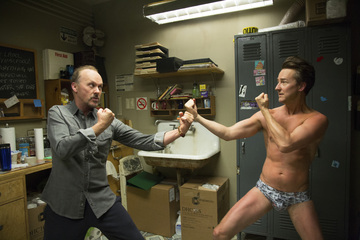
Before we start, here's a minor art history lesson;
In the early stages of the 20th Century, there came a new movement in the realms of avant-garde art: Cubism. Propelled by Georges Braque and Pablo Picasso (with whom the style is chiefly associated in the popular consciousness), Cubism was a manner of formal deconstruction, an attempt to break down a chosen subject and reassemble it as a single image presented from multiple perspectives.
Now, this may all seem like a rather ill-suited introduction to a review of Birdman, but I assure you that I am going somewhere with this, because if nothing else, Alejandro González Iñárritu is a film-maker who is clearly well-versed in de-constructing and reassembling individual events presented from multiple perspectives.

Riggan is not a respected man in his field. Having once been the toast of Hollywood action heroism in the guise of the eponymous comic book hero Birdman, he is now reduced to the status of a pop culture joke, an answer to a Trivial Pursuit question. To counteract this, he has come to the theatre, the last bastion of legitimacy for an actor, to recover his own sense of self-worth. Of course, no one wants to back him in this endeavour, making this self-written, self-directed, self-starring play also entirely self-financed. Riggan is embarking on the very definition of a vanity project, putting everything he has on the line for the sake of his own fragile ego. And by God, what a fragile ego it is.
It’s not that Riggan refuses to outgrow his most famous screen persona, in fact he’s desperate to do just that. However, he is beset by his own insecurities, which take the form of Birdman himself. Whilst Riggan attempts find truth in his art, Birdman hovers around, talking to him, reminding him of past Hollywood glories. Why not return to that? Forget all this “talky, depressing, philosophical bullshit and strap on the cape once again. Riggan ties himself in knots trying to separate himself from something that brought him fame and fortune, but left him artistically bereft. As desperate as he is to find himself creatively and express himself artistically, Riggan can’t escape the notion that he is incapable to reaching the heights he needs to because, that he simply isn’t good enough at what he wants to do. And it’s not just Birdman that’s trying to cut him down before he can prove himself.

And it’s in this conflict that we get one of the most significant ideas within the film: the subjectivity of Truth. Everyone here has his or her own version of the Truth, their own narrative, which rarely aligns with anyone else’s. Lesley wants to realise a dream; Mike wants it to feel real. Riggan wants to be taken seriously; Birdman wants Riggan to abandon his pursuit of legitimacy. As Art becomes a delusion and a redeemer, it’s Truth that becomes a weapon. When Riggan’s daughter Sam berates his desire relevance, or when Riggan bitterly sounds off against his would-be critic Tabitha, or even in irony when Birdman gleefully praises audiences for the decline of artistic standards in favour of heartless spectacle.
Yeah, Birdman is kind of a heavy deal. However, what keeps it from becoming the pretentious experiment in post-modern deconstructionism that it so often threatens to be is the incredible pace at which it all moves. Iñárritu has conceived of Birdman as one, long uninterrupted take, fluidly moving from set-up to set-up, aping the pursuit of theatrical authenticity and the relentless stream of unbroken pressure on its players. Cinematographer Emmanuel Lubezki’s work here is incredible, flowing from dressing rooms to backstage to onstage to the rooftop to the streets to soaring through the air. This seamless current of visual energy is matched by a wonderfully kinetic jazz drum score of Antonio Sánchez. At once maintaining the film’s pace and echoing its seemingly fractured state of mind, Sánchez has created a sentient metronome of a score that gloriously pulsates throughout.

Probably the greatest triumph of Birdman, however, is Michael Keaton. And not just in terms of the intertextual casting, but in what Keaton does with the role. Obviously, his past as the first cinematic Batman people care to remember serves him up as uniquely qualified to take on the role of an aging actor still struggling to escape from the shadow his most famous onscreen incarnation decades prior, and much can be made of how much of the resentment and gratitude he feels for the role makes into his turn as Riggan Thomson. However, Keaton is legitimately on career best form here. Be it something of real career disappointment or simply the work of a capable actor, there is never a moment when Riggan Thomson is anything other than real to us. Keaton really does do things here that very few people, if anyone else, could have achieved with the same level of intensity, humour and sadness. This is Keaton’s role and it took him decades to get here.
Birdman is a brilliant and layered piece of work, lighting on the personal struggles of artists trying to create and a searing indictment of populism overriding art itself, and showcasing virtuosic work on almost every field. From Antonio Sánchez’s kinetic jazz drum score to Emmanuel Lubezki’s incredible camerawork, Iñárritu’s tone-blending direction to Keaton’s frankly unbeatable lead performance. It may lose some with its near constant referential nature and an ending of dubious authenticity, but those willing to go along the journey and see all those strands through will have a goddamn blast.
Perhaps the biggest irony of Birdman is that, given Iñárritu’s previous propensity for more sombre and seriously-minded dramas, it may prove to not only be his most popular film to date, but the thing he will struggle to outdo with future films. Birdman may just become the dark and creeping voice on his shoulder beckoning him back for more of the same.
Birdman is out January 1st 2015

 RSS Feed
RSS Feed
